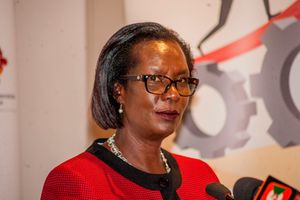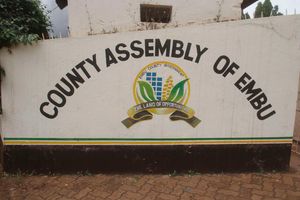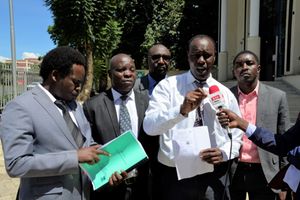
Kirinyaga County Assembly Deputy Speaker Jinaro Njamumo speaking at the Assembly in Kerugoya town.
Members of the County Assembly in Kirinyaga have not received their salaries for the past three months, Deputy Speaker Jinaro Njamumo has said.
"MCAs have been suffering as they have not received their dues for three months. They have been living in debt as they struggle to make ends meet," he said.

A signboard of Kirinyaga County Assembly.
Mr Njamumo made the remarks at the county assembly premises in Kerugoya town on Friday during a church service presided over by Murang'a Diocese Catholic Bishop Maria Wainaina.
"Bishop pray for us because the MCAs are in the third month without a coin in their pockets," Mr Njamumo, who is also the Mutithi Ward MCA, said. "We are now surviving on what we sell from our farms.”
Unpaid rent, fees
The Nation has established that other members of staff in the Kirinyaga Assembly have also not been paid their salaries.
"Like the MCAs, we have also not been paid our salaries for three months. Some of us have not paid house rent and school fees for our children," said one the employees, who spoke on condition of anonymity.
Complaints of persistent pay delays for MCAs have also been rampant in other counties.
Last year, MCAs in Murang’a County went on the rampage and destroyed furniture in the Clerk’s office as they protested over the delay of their salaries.
Due to the pay crisis, there has been a renewed push by the County Assemblies Forum (CAF) for county assemblies to have financial autonomy.
During a consultative session with the National Assembly Departmental Committee on Regional Development, CAF representatives appealed to Members of Parliament to pass the proposed amendments to the Intergovernmental Relations Bill, 2024.
At the mercy of CECs
"We can’t access our funds unless the county executive allows it, yet our budget is mostly operational and not for development projects. That’s the autonomy we’re asking for,” CAF Secretary-General Chege Mwaura said.
MCAs want their budgetary allocations to come directly from the National Treasury and not through their respective County Executive Committee Member for Finance.
Mandera Woman Representative Kassim Umul Ker Sheikh said that drawing from her experience as a two-term MCA, ward reps faced constant financial struggles.
“MCAs are often helpless. They are at the mercy of the county executive. They need operational budgets to work effectively,” she said.
Embu Woman Representative Pamela Njeru described the MCAs situation as dire.

Embu Woman Rep Pamela Njeru.
“MCAs are suffering. If they fall out with a governor or a CEC, everything stops. We need to break that cycle,” she said.
"They’re blocking assemblies from functioning while they’re supposed to be accountable to them. It is ironic that MCAs vet CEC Members, only to be later frustrated by the same officers,” she added.
"If a CEC is signing off cheques for assembly operations, how can MCAs truly perform oversight?" Ms Njeru posed.
Through the County Public Finance Laws (Amendment) Bill 2023, before the bicameral parliament, CAF is now pushing for financial autonomy and legal recognition of CAF.
“CAF plays a critical oversight and consultative role in our devolved system. Legal recognition would institutionalize this role and restore balance between the legislative and executive arms at the county level,” said Mr Mwaura.
CAF is also concerned about disparities in remuneration and influence, noting that CECs now earn nearly three times what MCAs get, despite initial uniformity at the start of devolution.
“This Bill must fix that imbalance," he added.
The committee is now compiling views from stakeholders, including CAF, and will prepare a comprehensive report for tabling in parliament.
In an interview with Nation, Kiambu County Assembly Speaker Charles Thiong'o backed the push for financial autonomy saying the move would eliminate incidents of frequent tussles between MCAs, Speakers and the executive, which often court impeachments.
"Most of the issues that lead to impeachments relate to finances of county assemblies, which Speakers have very little control over. The main challenge in this issue is the legal architecture of county assemblies, in which the Houses lack financial autonomy," said Mr Thiong'o, who is also a lawyer.
"County assemblies’ finances are still under the control of the county executive and that’s the reason we’ve been experiencing frequent wrangles in some counties. County assemblies should receive their funds directly from the exchequer," added Mr Thiong'o.
Mr Thiong'o also believes such issues can be avoided if MCAs are well-remunerated and facilitated.
"MCAs are the least facilitated among State officers. We have been pushing for a review of MCAs terms including job evaluation, to enable them to effectively discharge their functions. We have been pushing for Ward Fund for MCAs to be entrenched in law just like the National Government Constituency Development Fund, National Government Affirmative Action Find (NGAAF) and the proposed Senate Oversight Fund for Senators," he said.
The other challenge is the late disbursement of the exchequer funds by the National Government, which ultimately affects the operations of the assemblies and leads to friction.
The recent Sh4 billion budget cuts introduced through the County Allocation of Revenue Act (CARA), that were effected last year, according to CAF, further complicate the situation for county assemblies.
"The abrupt mid-year budget cuts will disrupt ongoing programmes, legislative processes and critical public participation efforts. Parliament should initiate an amendment of CARA to reverse the Sh4 billion budget cuts," added Mwaura.
CARA signed into law in December 2024, reduced county assembly budgets by Sh4 billion, while increasing county executive allocations by Sh7 billion.
The adjustment followed the collapse of the Finance Bill 2024, despite an overall increase of Sh2 billion in the county revenue shares.
MCAs have vowed to push for urgent interventions to ensure county assemblies attain financial autonomy.










